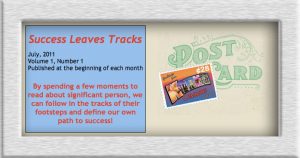Every script I’ve voiced, from the shortest audition to the longest audiobook…
Every call I’ve made…
Every email I’ve sent…
Every postcard I’ve mailed…
Every marketing campaign I’ve devised…
Every web site I’ve launched…
Every blog post I’ve written…
Every social media update I’ve made…
Every voiceover class or conference in which I’ve participated…
Every professional association meeting that I’ve attended…
…occurred while I worked a demanding, 40-hour-and-sometimes-more-a-week job.
After 12 years of concurrently working in a full-time job and a part-time voiceover business, it’s time for a change.
I’m thrilled to announce that I was offered an early retirement from my day job and will be doing voiceover work full-time beginning 1 January 2012! YAY!!
However, as excited as I am to start a wonderful new phase in my life, this post isn’t about me and my career plans. It’s about you.
I want to encourage you to follow your dreams and give you 5 quick tips to help you do it.


1) Make a list of what you WANT.
A list helps you stay focused and fight discouragement. It also is the foundation to manifesting your desires. If you don’t know what you want, how do you expect to get it?
If you don’t do anything else, I advise you to RUN, do not walk, to buy the IT WORKS booklet and then follow Brad Jensen’s extensive, amazing, and generous advice about using it.
As an example from my life, I made a list with attributes that I wanted in a job, like a certain income level, the ability to do voiceover work, and a private office with a door and window. I deliberately made the attributes a little more generic so that the list would cover my day job and my voiceover business. I reviewed this list frequently and added criteria over time, especially as I checked off attributes that were met.
Your results when working your list probably will turn out better than you could imagine. When I wrote that I wanted a private office with a door and window, I envisioned an office cubicle facing a window with tall walls on the other 3 sides. Of course, I would still be able to hear everyone around me in an open office concept.
What I got, though, was the ability to work in my gorgeous home office, which happens to have a solid wood door and 2 windows. It also has a TV, an iPod stereo, and a reasonable proximity to the refrigerator downstairs.
In another example, I wrote a new life list in September and included the fact that I want to be contracted at least once a month to voice an audiobook. I faithfully have reviewed my list, taken the actions suggested by the creative genie, and received 3 audiobook contracts since then, almost as if on schedule!
2) Think about WHY you want it.
I diligently worked in IT for over 25 years. I always knew that I was trading short-term creativity and gratification for long-term security.
However, having the day job didn’t mean I should put my dreams on hold….and neither should you!
So many people say things like “I’ll travel when I’m retired” or “I’ll start that business once the kids are out of school.”
If it’s your calling — as voiceover is to me — you want and need to do it to feed your soul. The only moment you know you have is this one, so why not be doing something because it makes you happy?
Yes, working full-time for an employer and part-time as an entrepreneur has its challenges. I would say it’s a challenge to pursue any calling when you don’t have unlimited time, money, and opportunity for it. The joy you get in pursuing your passion spills over into every other aspect of your life. Note that every passion does not lead to a career choice.
Also, since I mentioned the day job, let me just reiterate that having one can bankroll many of your dreams. You just have to change your perspective about it and know why you do what you do.
Knowing why you want something also helps you to prioritize the time, money, and opportunities that you have.
3) Don’t think about HOW you’re going to fulfill your dreams.
If you read any material on the Law of Attraction, the first thing you learn is to forget the HOWs. The forces of the Universe will conspire to bring about the changes you want when the time is right.
The only HOW to remember is this HOWEVER — the root word of Attraction is ACT. You can’t just think things and have them come true. You have to do your part to take ACTION. The forces of the Universe need your consistent thought and action, or no change is possible.
By constantly thinking of what you want and why you want it, the actions you need to take will be revealed to you over time.
4) Find a role model, and follow in their footsteps.
At the beginning of this article, I listed 10 things I consistently did for 12 years to build my voiceover business while still employed at a full-time job. I’m not saying I’m a role model, but think about it this way: If I did it, so can you.
Whatever your dream is, chances are good that someone else has done it. We live in the Information Age, with much of the world’s knowledge just a few keystrokes away. You can read about success stories and get ideas to advance your own dream.
5) Help other people achieve their dreams.
Your reality is the mirror of the thoughts and words you’ve been saying and the actions you’ve been taking.
To paraphrase Wayne Dyer, if you only focus on what you want, you’re essentially saying to the Universe “gimme, gimme, gimme”. The Universe then mirrors that line back to you, making you feel that you are, using Dyer’s words, always striving and never arriving.
On the other hand, if your thoughts, words, and actions are saying “how may I serve?”, the Universe mirrors that line back to you.
What you put out in the world comes back to you, in a way and from a source that you probably wouldn’t expect. If you are giving of time, attention, energy, and money to help other people, those things will come back to you.
As an example of this logic, a big reason that I write this blog is because I have a true desire to help other people. Because I write this blog, the Universe has sent that help back to me in the form of clients who find me because of my blog.
Retiring early from my day job and working as a full-time voice talent is definitely a dream come true! And yes….it was actually on my list!
Have you started writing your list? I’d love to get your comments on the blog!
Photo: iStockPhoto/ErikReis


